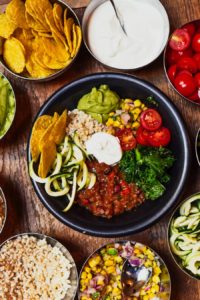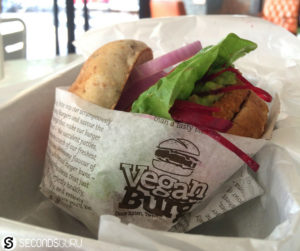Published 21 November 2022 ● Last Updated on 8 December 2022
It is often assumed that a vegetarian or vegan diet is not adequate because it lacks essential nutrients. Bearing its brunt, when I mention I am vegetarian, I am often asked, “Oh, how do you get your protein?” Followed by, “Are you sure you are getting enough of all the nutrients?”
Let’s take a look at a few of the widely held beliefs about a plant-based diet, and see if there is any truth to them.
3 myths about a vegan/vegetarian diet busted
#1 If you are vegan/vegetarian, you are doomed to a deficient diet
Truth is, with good planning and an understanding of what makes up a healthy, balanced vegan diet, you can get all the nutrients your body needs. Fruits, vegetables, whole grains, nuts… there is a plethora of plant-based foods out there, and appropriately, there is a wide array of nutrients they provide.

#2 Proteins = Meat
This is by far the most common myth that exists. While meats are protein dense, there is a multitude of plant foods too that are rich sources of the nutrient. The Recommended Daily Allowance (RDA) for protein for most people is 0.8 grams of protein per kilogram of healthy body weight and this is easily achievable while following a vegan/vegetarian diet.
Protein from rice, beans, corn, etc that are consumed throughout the day, supply enough essential amino acids that are required by the body. Tofu, lentils, beans, nuts, seeds, and whole grains are all protein-rich and can even provide for individuals who need more protein.
#3 Vegan eat only grass and greens
By now, you know this is far from true – to repeat what has gone before, plant-based food ranges from fruits and vegetables (and yes, leaves!) to legumes, beans, seeds, nuts, tofu. tempeh and more. Thanks to recent agro-tech trends, there is even a huge range of plant-based meats for those whose palettes cannot do without them! In Singapore alone, brands at supermarkets include Impossible, Beyond, Omni, LindaMc McCartney, The Vegetraian Butcher, among a growing list. This doesn’t even include home cooks and restaurants who cook up “fake meat” with recipes passed down generations.

Now that these myths are sorted, I admit, yes – without adequately planning your plant-based diet, you run the risk of missing out on some essential nutrients like calcium, iron, vitamin B12, selenium, and omega 3s.
Nutrients that could be missing in your vegan diet
Calcium
In order to maintain bone health, we need calcium. Milk and allied products are a key source of calcium, but not the only source. While calcium is definitely one of the hardest to get on a vegan diet, there are ample plant-based options – especially seeds and dark leafy greens. Take note of where to get your fix:
- Sesame seeds and tahini, chia seeds, flax seeds
- Kale, broccoli, cabbage, okra, Brussel sprouts
- Almonds, brazil nuts, walnuts, pistachio
- Pulses and legumes
- Raisins, prunes, figs, apricots
- Soy, beans, peas
- Grains like amaranth & teff
- Figs, oranges, blackcurrants, raspberries
Vitamin D is required for proper absorption of calcium in the body. We who live closer to the equator are blessed that the sunshine vitamin is available in plenty to us. So wait not, go out and bask in the sun!
Iron
Hemoglobin helps carry oxygenated blood through the body from the lungs, and iron is essential to produce this and various other hormones. The reason iron is on the deficient list for vegans/vegetarians is that the body absorbs iron from plant food less efficiently than from meat. So, while your diet can be iron-rich, the absorption can still be far less when you are a vegan/vegetarian. To meet your daily needs, ensure you get a generous proportion of these on your plate:
- Spinach, Brussel sprouts, kale, mushrooms, tomatoes, potato
- Sesame seeds, cashews, flaxseed, pistachios
- Kidney beans, navy beans, black beans, peas
- Tofu
- Soaked & cooked lentils
- Blackstrap molasses
- Goji berries, raisins, dates, prunes
- Pomegranate, watermelon, avocado, strawberries
Vitamin C is known to aid in the absorption of iron; so complement eating iron-rich foods with a rich source of vitamin C .
Vitamin B12
DNA, red blood cells, some neurotransmitters, and myelin, the protective sheath that insulates nerves are all dependent on vitamin B12 to be produced. While this vitamin is found in abundance in meat, plant sources are available too.
- Nutritional Yeast, yeast spreads
- Chlorella
- Shitake mushroom
- Fermented food tempeh, idly/dosa, miso, kimchi
- Seaweed
Though as of now supplementing vitamin b12 to your diet seems like the only viable source to get your daily requirement of this vitamin.
Selenium
A trace element that is essential for humans, selenium is a constituent of more than two dozen selenoproteins that play critical roles in reproduction, thyroid hormone metabolism, DNA synthesis, and protection from oxidative damage and infection. Tough selenium is hard to come by in a vegan diet since its RDA is not very high; nevertheless, selenium deficiency isn’t particularly common. Include these in your diet to get your selenium requirement fulfilled
- Coconut meat
- Brazil nut, cashew,
- Chia, flax, sesame, peanuts
- Brown rice, oats, barley, rye
Omega 3s
These are polyunsaturated fatty acids, essential fats that are important for cardiovascular health and brain health, among other things. There are three important omega-3 fatty acids – Eicosapentaenoic acid (EPA) and docosahexaenoic acid (DHA), usually found in marine oils, and alpha-linolenic acid (ALA), found in plant oils. It is possible to get enough omega-3s on a plant-based diet, the only concern though is that the body has to work hard to convert ALA to the usable form of EPA and DHA. Food rich in the omegas include
- Walnut
- Chia, flax, hemp
- Brussel sprouts
- Plant oil
- Black rice
To eat or not to eat
Apart from being planet friendly, a plant-based diet is beneficial to your body as well because it reduces the burden on your digestive system, leading to a healthier you!
Food habits are not easy to change but a good beginning is half done. So, if you are someone who eats meat all days of the week, begin by abstaining for a couple of days in the week, every small step counts.
Related links
7 Vegan Popsicle recipes to try if you have a sweet tooth and a greedy eye!




0 Comments